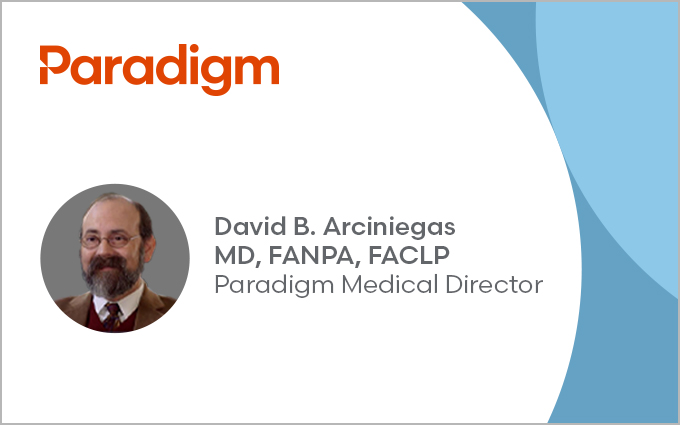02/15/2021

Our Paradigm Medical Directors are essential to our ability to deliver positive outcomes for the people we help. These clinical physicians coordinate care with our network managers and support the recovery process by applying decades of experience and clinical data, while working closely with other medical experts inside and outside of the organization. By bringing their highly specialized backgrounds to these challenging cases, Paradigm Medical Directors help to overcome barriers to care and anticipate the complex needs of these injured workers.
In this ongoing series, we will be putting a well-deserved spotlight on our team of Paradigm clinicians and their respective areas of expertise. For this installment, we spoke to David B. Arciniegas, MD, FANPA, FACLP, who specializes in the care of individuals with acquired brain injuries. Dr. Arciniegas is a graduate of the University of Michigan Medical School and brings a prestigious clinical and research background spanning decades to his work helping people with brain injuries achieve the best possible outcomes. We recently sat down with Dr. Arciniegas to discuss how he came to his specialty and the importance of behavioral health support for these patients and their families.
Finding the intersection of medicine, neuroscience, and service
While still in school, Dr. Arciniegas recalls searching for a career that could balance a variety of interests. “I was always interested in the intersection of biology, psychology, philosophy, and service, which for me, led naturally to a number of pathways within the clinical neurosciences,” he explains. “My education set me on a path toward medicine pretty early on, and through my interests, I was drawn to psychiatry, neurology, or some combination of the two.”
Now, working in the field of behavioral neurology & neuropsychiatry, Dr. Arciniegas has found a subspecialty that he finds intellectually and experientially compelling. It’s one that allows him to be of service to people in serious need. “Thirty years later, it’s a choice that I’m glad to find has lined up with my expectations.”
Focusing on the evaluation management and rehabilitation of patients with acquired brain injuries across the injury severity spectrum would eventually bring Dr. Arciniegas to Paradigm. “I had the good fortune to meet (Paradigm Chief Medical Officer) Dr. Michael Choo in my role as Chairman and CEO of the International Brain Injury Association,” he says. “Hearing Dr. Choo describe the work that Paradigm does, and having experience with Paradigm as an inpatient neurorehabilitation consultant and program director, it was clear that it aligned with my focus on the severe end of brain injury.”
As the nature and scope of his work evolved, Dr. Arciniegas eventually saw Paradigm as a natural fit and was thrilled to join when the time was right. “Dr. Choo and Jo Carter (Paradigm Vice President, Network Services) could not have been more welcoming. From the beginning, it was apparent that we had the ability to do really interesting and creative work together that would tangibly help people with substantial needs.”
The importance of behavioral health support and the need for an outcome-focused approach
One of the throughlines of Dr. Arciniegas’s clinical work and research has been the need for a holistic view of how neuroscience, psychiatry, and health care interact, particularly in the treatment of individuals with brain injury. “Helping people with brain disorders requires a comprehensive view of neuropsychiatric health and illness, understanding that the neurology and the psychiatry of these disorders are a single thing.”
His presence at Paradigm complements our ongoing organizational focus on treating acquired brain injury in the workplace not just as a medical condition, but also as encompassing the larger behavioral health needs of the patient and the family. “To understand outcomes after brain injuries, we must attend to the brain injury and also to the person who was injured—the resiliencies and vulnerabilities—and to the contexts into which they go thereafter. Understanding the interaction of pre-injury, injury, and post-injury factors on outcomes is a core tenet of brain injury neuropsychiatry,” says Dr. Arciniegas.
Part of this idea is expressed in the concept of the biopsychosocial model of care, which encompasses biological, psychological, and sociological aspects that can all play a role in recovering from illness or injury. As a Paradigm Medical Director, Dr. Arciniegas brings this approach to each case he’s involved with—and he continually feels supported in this work. “My experience with Paradigm has been an enormously positive one,” he reflects. “The emphasis that we place on outcome-focused care, the construction of evidence-informed treatment plans, and the collaboration with interdisciplinary treatment teams, including behavioral health networks, to achieve specific outcomes is one that I really think should serve as a model for health care more generally.”
He continues, “We all work very hard, as a team, to focus on long-term functional recovery and ensure delivery of the right care in the right way at the right time and duration for every injured worker. I believe that this approach benefits the injured workers we serve and their families.”
Learn more about Paradigm’s commitment to an outcome-focused and biopsychosocial approach when treating catastrophic injuries.